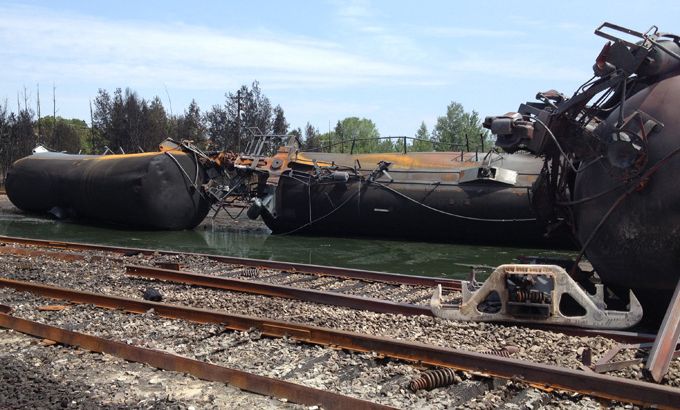Canada train disaster death toll rises to 13
Officials warn total likely to climb with 50 people still missing, as evacuated residents return three days after blast.

The death toll from an oil train derailment and explosion in Quebec, Canada has risen to 13, with 50 people still missing, three days after the disaster.
Authorities said on Tuesday that the number of deaths from the incident in the tiny tourist town of Lac-Megantic was expected to climb, as many of the evacuated residents were finally allowed to return to their homes to assess the damage after the fire was extinguished.
Keep reading
list of 4 itemsAs Israel attacked Gaza’s north, 26 members of his family were wiped out
What is Trident, the US floating pier off Gaza? Will it work?
Does Israel’s Netanyahu have a plan for a ‘day after’ the war on Gaza?
Steve Lemay, the parish priest of Lac-Megantic, said that families he had comforted were now awaiting for confirmation of the deaths of their missing loved ones.
“It’s clear that they are not waiting for the missing to return,” he said.
Quebec police said late on Monday that they had so far recovered 13 bodies from the blackened rubble of what was once
the historic central strip.
Provincial police Sergeant Benoit Richard said eight bodies had been found in the wreckage after firefighters doused the flames and cooled down some of the oil tankers that were in danger of exploding.
DNA samples
Five bodies were found over the weekend, and police would not say where the newly discovered ones were, for fear of upsetting families.
All but one of the train’s 73 tanker cars were carrying oil when they came loose early on Saturday, sped downhill for almost 11km into Lac-Megantic, near the Maine border, and derailed. At least five of the cars exploded.
The coroner’s office asked relatives of the missing to bring in brushes, combs and razors so specialists could extract DNA samples from strands of hair.
While emergency crews accessed the disaster scene, police urged residents to stay out of the perimeter, which extended about 500 metres in all directions from the crash site, because it was being treated as a crime scene until foul play was ruled out.
Authorities said about 1,500 of the 2,000 people evacuated after the accident would be allowed home over the next few days, with the first groups expected to return on Tuesday.
‘Unbearable heat’
By Monday evening, emergency crews had finally reached the Musi-Cafe, a central bar near the epicentre of the blast.
A band was performing that night and the building was packed with people, said witnesses including Jean-Sebastien Jacque, 24, who was walking towards the cafe at the time of the disaster.
“I don’t know how many friends I lost that night,” he said.
He shot a video on his mobile phone soon after the crash, when a ball of fire engulfed buildings and then another explosion made him run so quickly his shoes came off.
“The heat was unbearable,” he said. “It was like holding your hand over a flame, but it was my entire back.”
The rail tankers involved in the derailment, known as DOT-111, have a history of puncturing during accidents, the lead Transportation Safety Board (TSB) investigator said.
TSB investigator Donald Ross said Canada’s TSB had gone on record saying that it would like to see improvements on these tankers, but he said it was too early to say whether a different tanker could have avoided the tragedy.
“There’s a lot of factors involved,” Ross said.
“There’s a lot of energy here. The train came down on a fairly significant grade for 6.8 miles (10.9 kilometres) before it came into the town and did all the destruction it did.”